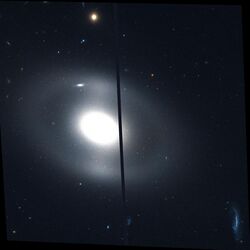Astronomy:NGC 4340
| NGC 4340 | |
|---|---|
 Hubble Space Telescope image of NGC 4340 | |
| Observation data (J2000 epoch) | |
| Constellation | Coma Berenices |
| Right ascension | 12h 23m 35.3s[1] |
| Declination | 16° 43′ 20″[1] |
| Redshift | 0.003112/933 km/s[1] |
| Distance | 56,070,000 ly |
| Group or cluster | Virgo Cluster |
| Apparent magnitude (V) | 12.10[1] |
| Characteristics | |
| Type | SB0^+(r) [1] |
| Size | ~ 53,400 ly |
| Apparent size (V) | 3.5 x 2.8[1] |
| Other designations | |
| CGCG 99-36, MCG 3-32-21, PGC 40245, UGC 7467, VCC 654[1] | |
NGC 4340 is a double-barred lenticular galaxy[2][3] located about 55 million light-years away[4] in the constellation of Coma Berenices.[5] NGC 4340 was discovered by astronomer William Herschel on March 21, 1784.[6] NGC 4340 is a member of the Virgo Cluster.[2][3] NGC 4340 is generally thought to be in a pair with the galaxy NGC 4350.[6][7]
Physical characteristics
NGC 4340 has a small inner bar embedded in a luminous stellar nuclear ring. Even though the ring is luminous, there are no star-forming regions. Instead, the ring is made of mostly old stars in a gas-poor environment. The color of the ring is the same as the color of the surrounding bulge suggesting that it is probably an old, “fossil” remnant of an earlier episode of star-formation.[2] Crossing the inner ring, there is a larger primary bar with ansae at the ends.[3] Careful inspection shows that the two bars are slightly misaligned, which suggests they may be independently rotating.[2] The larger primary bar connects to another ring that surrounds the central regions of the galaxy.[7]
SN1977A
On January 27, 1977 a supernova of an unknown type was discovered in NGC 4340.[8][9]
See also
References
- ↑ 1.0 1.1 1.2 1.3 1.4 1.5 1.6 "NASA/IPAC Extragalactic Database". Results for NGC 4340. http://nedwww.ipac.caltech.edu/.
- ↑ 2.0 2.1 2.2 2.3 Erwin, Peter; Vega Beltr'an, Juan Carlos; Beckman, John (2001). "NGC 4340: Double Bar + Fossil Nuclear Ring". Astrophysics and Space Science 277 (Suppl 1): 457. doi:10.1023/A:1012798126831. Bibcode: 2001ApSSS.277..457E.
- ↑ 3.0 3.1 3.2 "NGC 4340 - SB(r)0+". http://kudzu.astr.ua.edu/devatlas/NGC_4340______B___________.html.
- ↑ "Your NED Search Results". https://ned.ipac.caltech.edu/cgi-bin/objsearch?objname=NGC+4340&extend=no&hconst=73&omegam=0.27&omegav=0.73&corr_z=1&out_csys=Equatorial&out_equinox=J2000.0&obj_sort=RA+or+Longitude&of=pre_text&zv_breaker=30000.0&list_limit=5&img_stamp=YES.
- ↑ Rojas, Sebastián García. "Galaxy NGC 4340 - Galaxy in Coma Berenices Constellation · Deep Sky Objects Browser" (in en). https://dso-browser.com/deep-sky/5381/ngc-4340/galaxy.
- ↑ 6.0 6.1 "New General Catalog Objects: NGC 4300 - 4349" (in en-US). http://cseligman.com/text/atlas/ngc43.htm#4340.
- ↑ 7.0 7.1 König, Michael; Binnewies, Stefan (2017-09-30). The Cambridge Photographic Atlas of Galaxies. Cambridge University Press. p. 259. ISBN 978-1-107-18948-5. https://books.google.com/books?id=JY0wDwAAQBAJ&pg=PA259.
- ↑ "IAUC 3035: SN IN NGC 4340; 1977a; 1974c; 29999-321-3044". http://www.cbat.eps.harvard.edu/iauc/03000/03035.html.
- ↑ "1977A - The Open Supernova Catalog" (in en-US). https://sne.space/sne/1977A/.
External links
- NGC 4340 on WikiSky: DSS2, SDSS, GALEX, IRAS, Hydrogen α, X-Ray, Astrophoto, Sky Map, Articles and images
 |


